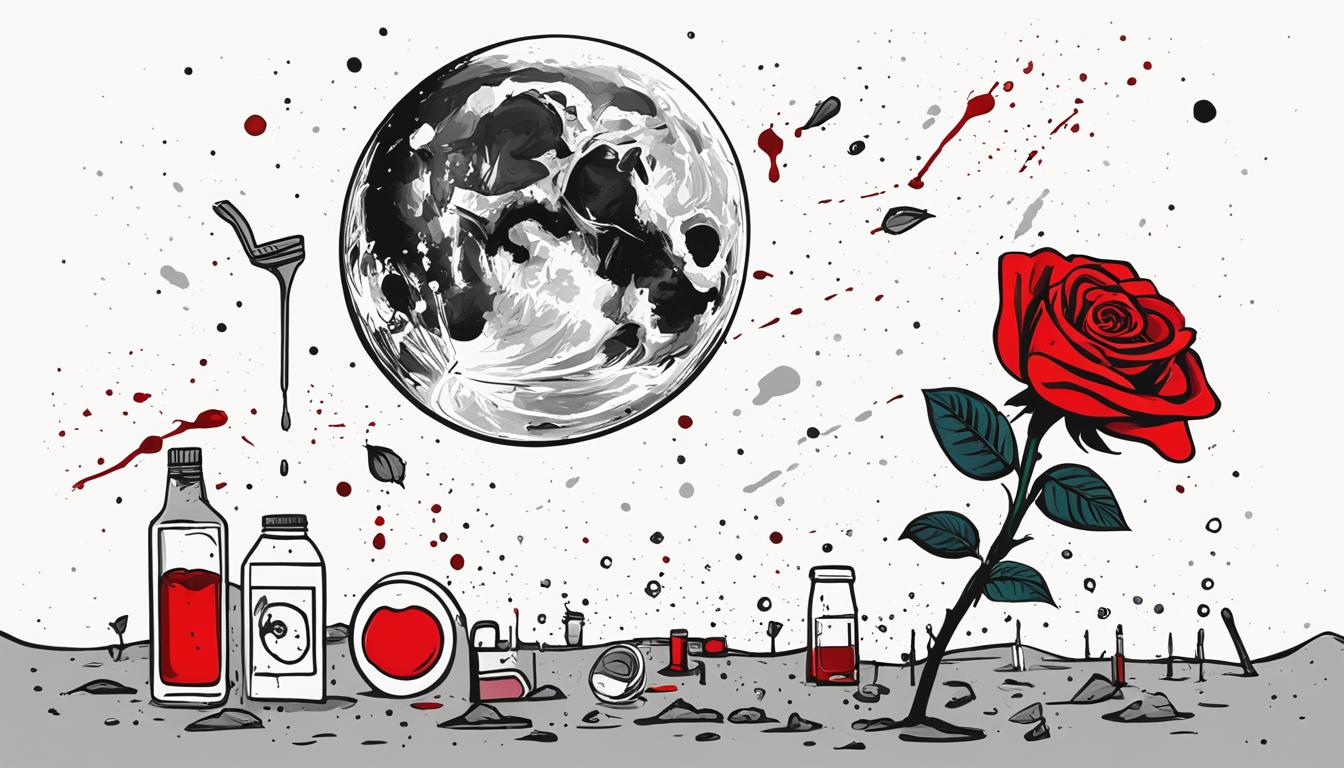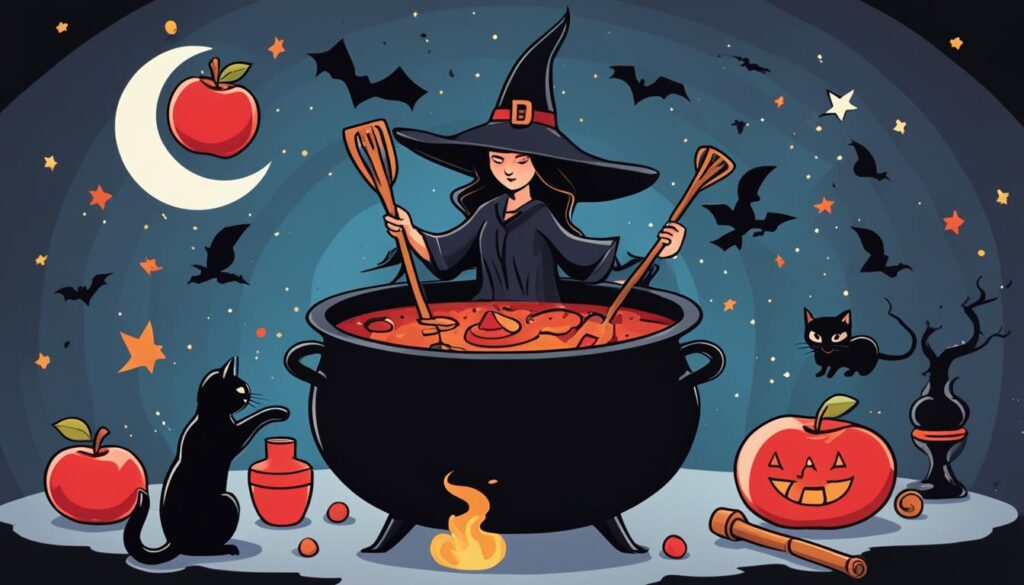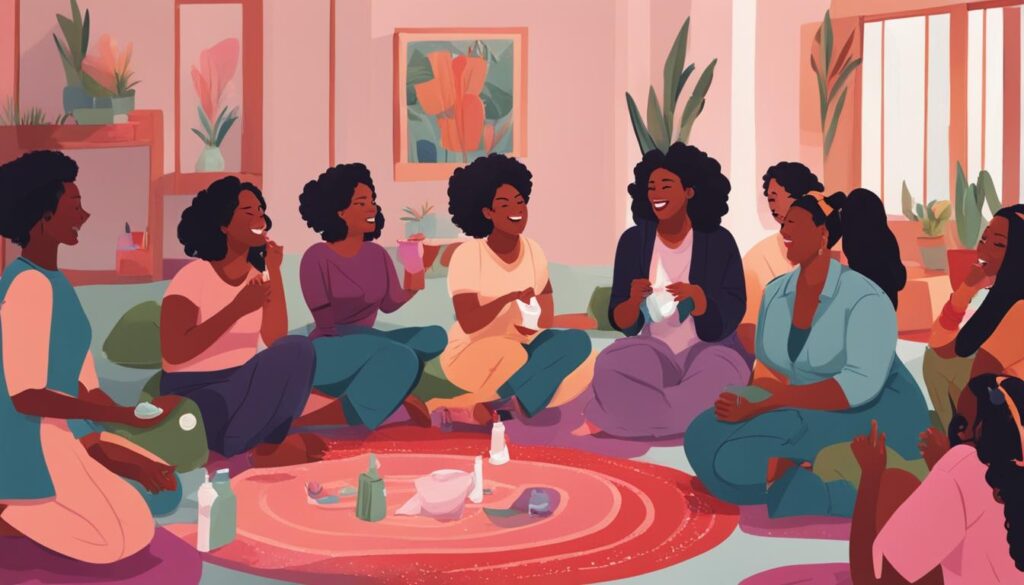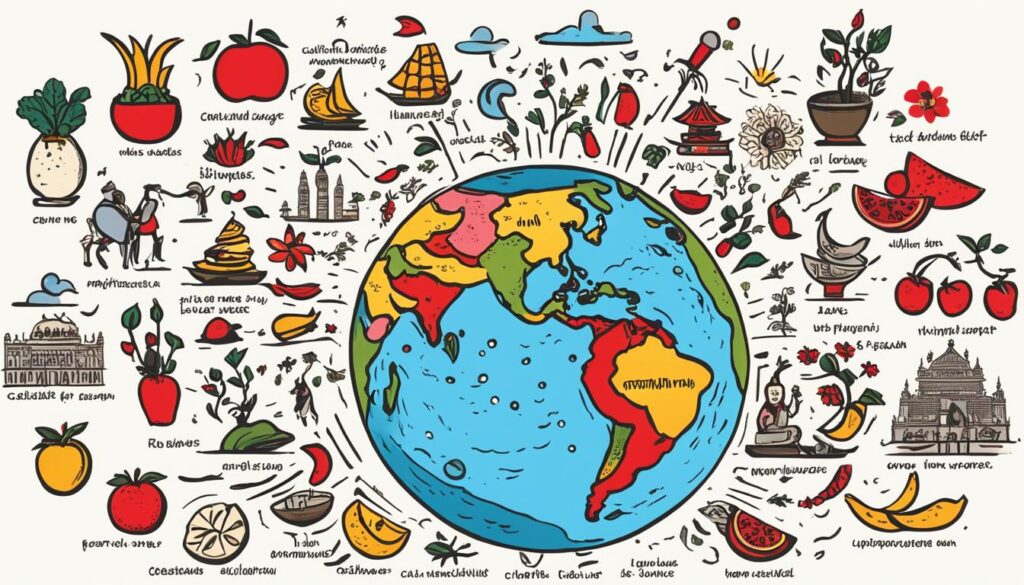Menstruating is a natural part of life for many women, but sometimes we may want to find creative ways to talk about it. According to an international study by app Clue and the Women’s Health Coalition, there are as many as 5,000 ways to describe menstruation. While some phrases are common, like ‘time of the month’ and ‘the blob,’ others are more unique and poetic, such as ‘birthing a blood diamond’ or ‘the cranberry woman is coming’. Let’s explore some of these fascinating ways to express ‘I’m on my period’.
Key Takeaways:
- Menstruation can be described in countless creative and poetic ways.
- There are as many as 5,000 ways to express ‘I’m on my period’.
- Common phrases like ‘time of the month’ and ‘the blob’ coexist with unique and poetic euphemisms for periods.
- Exploring diverse expressions for menstruation can help break the taboo and promote period positivity.
- Language plays a powerful role in shaping perceptions and attitudes towards menstruation.
Common Phrases for Being on Your Period
When it comes to discussing periods, there is a rich tapestry of language that has bloomed over time. People have ingeniously created euphemisms and expressions to delicately convey the experience of being on their period. These poetic phrases not only cloak the topic in a veil of mystery but also provide a sense of camaraderie among those who share in this natural bodily occurrence. Let’s explore some of the most common and recognizable phrases for being on your period.
Aunt Flo
Ah, Aunt Flo is paying her visit once again. The whimsical nickname bestowed upon our monthly cycle adds a touch of familiarity to an otherwise enigmatic phenomenon. It evokes a close relative who arrives unannounced, bearing gifts of cramps and bloating.
Time of the Month
The euphemistic phrase ‘time of the month’ elegantly captures the cyclical nature of our menstrual cycle. It reminds us that like the moon, we go through phases, experiencing the ebb and flow of our bodies.
On the Rag
An expression that harkens back to the days when women used cloth rags for menstrual protection, ‘on the rag’ keeps the conversation light-hearted and relatable. It serves as a reminder that even during this period, we carry on with our daily lives, persevering through any discomfort.
Red Tide/Army
Comparing our menstrual flow to the powerful surge of a tide or the marching of an army, these phrases pay homage to the force and determination we possess during this unique time. It emphasizes the strength and resilience that all menstruating individuals embody.
Code Red
‘Code Red’ borrows from the world of emergency situations, where immediate attention is required. Similarly, it is an alert that signals the need for self-care and understanding during this phase of our menstrual journey.
Monthly Visitor
Like a visitor who comes knocking on our door every month, this phrase humorously acknowledges the predictable arrival of our menstrual cycle. It acknowledges the temporary presence of something that is both natural and necessary for our reproductive health.
“Aunt Flo, Time of the Month, On the Rag, Red Tide/Army, Code Red, and Monthly Visitor – these expressions weave a colorful tapestry of language around a topic that has been whispered for far too long. They provide us with whimsy, camaraderie, and a sense of solidarity in our shared experience.”
These common phrases have become embedded in our culture, transcending generations and borders. They create a shared language that allows us to communicate about menstruation without discomfort or shame. Let’s celebrate the creativity and ingenuity that has given rise to these expressions.
Bizarre Phrases for Being on Your Period and Their Origin
In addition to the common phrases, the world of period slang is filled with truly bizarre expressions that add a touch of whimsy to the conversation. These phrases often stem from different cultures, each with its own unique origin story. Let’s delve into some of these peculiar and enchanting ways to refer to menstruation.
“There are Communists in the Funhouse”
Denmark brings us a peculiar phrase that evokes a sense of intrigue and chaos. In the Danish language, they say “der er kommunister i tivoliet,” which translates to “there are communists in the funhouse.” This curious expression embodies the idea of upheaval and unexpected surprises that come along with the visit from Aunt Flo.
“Granny’s Stuck in Traffic”
Meanwhile, in South Africa, a playful and unexpected expression for menstruation emerged. They refer to it as “Granny’s stuck in traffic.” This delightful phrase paints a vivid picture of a beloved granny navigating her way through the bustling streets, reminding us that even the most ordinary aspects of life can be transformed into poetic musings.
“There are communists in the funhouse” – Denmark
“Granny’s stuck in traffic” – South Africa
These imaginative phrases add an interesting twist to the conversation around periods, inviting us to explore the rich tapestry of period slang from around the world. They not only spark curiosity but also serve as a reminder of the beauty that can be found in the unexpected and the ordinary.
| Country | Phrase |
|---|---|
| Denmark | “There are communists in the funhouse” |
| South Africa | “Granny’s stuck in traffic” |
Through these fascinating and whimsical expressions, we discover the power of language to capture the essence of menstruation in surprising ways. By embracing the peculiar and celebrating the diversity of period slang, we can challenge taboos and reshape the narrative surrounding periods.
The Importance of Period Talk and Breaking the Taboo
Breaking the taboo around periods is of utmost importance. For far too long, menstruation has been shrouded in secrecy and shame, creating a culture of silence. But it’s time to change that. By having open conversations about menstrual health, we can break down barriers, educate others, and empower women.
Periods are a natural and normal part of a woman’s life. They should never be hidden away or treated as something dirty. By embracing period talk, we can challenge the societal norms that have perpetuated the stigma around menstruation. Initiatives like the “Apple Women’s Health Study” are paving the way for greater understanding and acceptance by demystifying menstrual health and giving it the scientific recognition it deserves.
Discussing periods openly not only benefits individual women but also society as a whole. When we talk about periods, we raise awareness about menstrual health issues, such as menstrual disorders, reproductive health, and access to hygiene products. This knowledge is crucial for both women and men, as it fosters empathy, understanding, and support.
| Importance of Period Talk: | Breaking the Taboo: |
|---|---|
| 1. Education: Open conversations about periods provide an opportunity to educate others about menstrual health, dispelling myths and misconceptions. | 1. Empowerment: Breaking the silence around periods empowers women to take control of their bodies and advocate for their health. |
| 2. Awareness: Discussing periods openly raises awareness about menstrual disorders, reproductive health, and the importance of access to hygiene products. | 2. Normalization: By openly discussing periods, we normalize menstruation and remove the shame associated with it. |
| 3. Support: Period talk fosters support and understanding from both women and men, creating a more empathetic society. | 3. Equality: Breaking the taboo around periods is a step towards gender equality, as it challenges patriarchal norms that suppress women’s voices. |
By embracing period talk and breaking the taboo, we can create a world where menstruation is no longer stigmatized, but celebrated as a natural and beautiful part of life. Let’s continue to have open and honest conversations about menstrual health, empowering women and ensuring that everyone has the knowledge and resources to maintain their well-being.
Funny Alternatives for Saying ‘I Have My Period’
In addition to the common and bizarre phrases, there are also funny alternatives for saying ‘I have my period’. These phrases add humor and playfulness to the conversation. Some examples include:
- “It’s my lady business”
- “I’m wearing the red badge of courage”
- “Checking into the red roof inn”
These alternative expressions can help lighten the mood and make talking about periods more enjoyable.
Funny Alternatives for Saying ‘I Have My Period’
| Phrase | Description |
|---|---|
| “It’s my lady business” | A humorous way to refer to menstruation, likening it to owning a business. |
| “I’m wearing the red badge of courage” | A playful and brave euphemism for having one’s period. |
| “Checking into the red roof inn” | A humorous reference to staying at a hotel, indicating that one is experiencing their menstrual flow. |
The Cultural Significance of Period Euphemisms
Euphemisms related to periods carry a rich cultural significance, reflecting the diversity and creativity of different countries and languages. These unique expressions not only add color to conversations about menstruation but also shed light on societal attitudes and beliefs surrounding this natural bodily process.
One notable example comes from the French language with the phrase ‘Les Anglais ont debarqué,’ which translates to ‘the English have landed.’ This euphemism creates a dramatic image, alluding to the arrival of something significant and powerful. In the context of menstruation, it captures the notion that periods can bring about profound changes and transformations.
French and English languages have been found to be particularly inventive when it comes to period euphemisms. The use of poetic phrases and metaphors allows for a nuanced and symbolic exploration of this biological phenomenon. By employing expressive language, individuals can navigate conversations about periods with artistry and grace.
While France and England have contributed extensively to the realm of period euphemisms, other countries have their own unique expressions as well. For instance, in China, a commonly used euphemism for menstruation is ‘riding the red flower boat.’ This poetic description conjures images of graceful movement and journeys, symbolizing the natural rhythm of a woman’s monthly cycle.
Below is a comparative table showcasing some of the most interesting period euphemisms from different cultures:
| Country | Euphemism |
|---|---|
| France | Les Anglais ont debarqué |
| China | Riding the red flower boat |
| Denmark | Communists in the funhouse |
| South Africa | Granny’s stuck in traffic |
These examples provide a glimpse into how different cultures have assigned meaning and significance to menstruation. Such euphemisms serve as a powerful reminder of the universal nature of periods and the cultural nuances that shape our understanding of them.
The Influence of Cultural Factors
The diversity of period euphemisms across cultures highlights the importance of cultural factors in shaping our attitudes and perceptions of menstruation. The use of poetic language and imaginative expressions allows societies to navigate the topic of periods in ways that are both intriguing and respectful.
Through these euphemisms, societies can convey complex emotions, challenges, and experiences related to menstruation. They serve as a means of connection and understanding, fostering dialogue and empathy among individuals who share the same cultural background.
In exploring the cultural significance of period euphemisms, we uncover not only the diversity of language and expression but also the shared experiences and challenges faced by women worldwide.
By acknowledging and celebrating the cultural significance of period euphemisms, we can create a more inclusive and supportive environment that promotes open discussions about menstruation. Embracing this diversity allows us to break down taboos, challenge stigmas, and empower women to embrace their bodies and experiences with pride and confidence.
The Power of Language in Shaping Perceptions
Language has a remarkable ability to shape our perceptions and attitudes towards menstruation. By choosing the right words and expressions, we can transform the way we think about periods and break free from the societal stigma surrounding them. Embracing euphemisms and poetic phrases allows us to have more comfortable and positive discussions about this natural bodily process.
When we reframe the conversation about periods, we challenge the existing menstrual stigma. Instead of using derogatory terms or hiding behind vague references, we can use empowering language that celebrates the beauty and strength of menstruation. This shift in language opens the door to period positivity and encourages others to feel more comfortable talking about their own experiences.
Imagine a world where we can freely express that we are on our period without shame or embarrassment. By choosing creative and empowering expressions like “I’m embracing my lunar cycle” or “I’m celebrating my womanhood,” we can transform the way we view and talk about menstruation.
“Language shapes our thoughts, and our thoughts shape our reality. By using empowering words related to periods, we can challenge the deeply ingrained stigma and help create a society that values and supports women’s health.”
The power of language extends beyond individual conversations. It has the potential to reshape societal attitudes towards menstruation as a whole. When we collectively adopt positive and inclusive language, we create a culture that embraces period talk and supports women throughout their menstrual journey.
So let’s choose words that inspire, uplift, and empower. Let’s celebrate the beauty of our bodies and break free from the shackles of menstrual stigma. By changing the way we talk about periods, we can change the world.
The Language of Empowerment
Here are some examples of empowering and creative ways to express ‘I’m on my period’:
- “I am in the embrace of the crimson tide”
- “I am honoring my sacred cycle”
- “I am dancing with the moon”
| Euphemism | Meaning |
|---|---|
| “Crimson tide” | Signifying the power and strength of menstruation |
| “Honoring my sacred cycle” | Recognizing the natural rhythm of a woman’s body |
| “Dancing with the moon” | Emphasizing the connection between the lunar cycle and menstruation |
Language has the power to transform how we perceive and talk about menstruation. Let’s use it to promote period positivity, challenge menstrual stigma, and create an inclusive society where women can freely express themselves.
Embracing Period Talk and Empowering Women
As I dive into the world of period conversations, I find myself inspired by the power it holds. By openly discussing periods and using creative expressions, we not only break down societal barriers but also empower women in the process. Normalizing menstruation and giving it the attention and respect it deserves is crucial in promoting overall well-being and understanding.
Embracing period talk creates a space where women can freely share their experiences, challenges, and triumphs. It allows us to connect on a deeper level and cultivate a sense of solidarity. Sharing our stories and supporting one another in this journey fosters empowerment and helps break the silence surrounding periods.
“Periods don’t define us; they make us stronger. It’s through conversations that we find our power,”
These conversations are not limited to women alone. Men and individuals of all genders can play a vital role by actively participating in period discussions. By educating themselves and engaging in empathetic conversations, they become allies, breaking the stigma and creating a more inclusive society.
Education for Empowerment
One of the key aspects of embracing period talk is fostering knowledge and education. By providing accurate information about menstrual health and hygiene, we empower individuals to make informed choices regarding their bodies.
As part of this empowerment journey, I am reminded of companies like Always, which have initiated educational programs reaching millions of girls globally. By creating awareness about periods and providing access to menstrual products, they are breaking down barriers and empowering women to embrace their bodies.
The Power of Language
Language plays a significant role in shaping perceptions and attitudes towards periods. By using empowering and inclusive language, we can challenge stereotypes and promote a positive mindset surrounding menstruation.
I recall a powerful quote by Maya Angelou, “Words are things. We must be careful about the words we use. Someday we will be able to measure the power of words”. Let us harness the power of words to uplift, educate, and empower.
Embracing period talk is about celebrating our bodies, our stories, and our strength. Through open conversations and creative expressions, we break free from the chains of silence and empower ourselves and others. Let us join hands in embracing period talk and fostering a society where every individual feels empowered, respected, and understood.
| Benefits of Embracing Period Talk | Empowerment through Period Conversation |
|---|---|
| 1. Breaking down societal barriers | 1. Fostering solidarity and understanding |
| 2. Promoting menstrual health | 2. Creating a more inclusive society |
| 3. Highlighting the importance of education | 3. Challenging menstrual stigma |
| 4. Empowering women and individuals of all genders | 4. Promoting period positivity |
Conclusion
Finding other ways to express ‘I’m on my period’ can be both fascinating and empowering. The wide array of common phrases and unique euphemisms offers a fresh perspective on discussing menstruation, opening up the conversation to new possibilities and embracing period talk. By breaking the taboo surrounding periods and promoting period positivity, we can create a more inclusive and supportive society for women.
Language plays a crucial role in shaping perceptions, and by choosing empowering and creative expressions for periods, we can challenge menstrual stigma and foster a sense of empowerment. These expressions not only make conversations about menstruation more comfortable but also celebrate the diversity and beauty of language.
Let’s continue to navigate conversations about periods with confidence and creativity, embracing the power of language to promote understanding and inclusivity. As we celebrate the progress made in normalizing period talk, let us remember that every conversation counts in breaking down societal barriers and empowering women. Together, we can create a world where menstruation is embraced as a natural part of life, and women’s health is given the attention and respect it deserves.
FAQ
What are some common phrases for being on your period?
Some common phrases include ‘Aunt Flo’, ‘time of the month’, ‘on the rag’, ‘red tide/army’, ‘code red’, and ‘monthly visitor’.
Are there any bizarre phrases for being on your period?
Yes, there are some truly bizarre expressions from different cultures. For example, in Denmark, they say ‘there are communists in the funhouse’, and in South Africa, they refer to it as ‘Granny’s stuck in traffic’.
Why is it important to break the taboo around periods and have open conversations about menstrual health?
Discussing periods openly can help educate others, promote menstrual health, and empower women. Breaking the taboo around periods can also demystify menstruation and give it the scientific recognition it deserves.
Are there any funny alternatives for saying ‘I have my period’?
Yes, there are funny alternatives such as ‘It’s my lady business’, ‘I’m wearing the red badge of courage’, and ‘checking into the red roof inn’.
What is the cultural significance of period euphemisms?
Different countries and languages have their own unique expressions for periods, which reflects cultural beliefs and attitudes. For example, the French phrase ‘Les Anglais ont debarqué’ translates to ‘the English have landed’ and is a dramatic way of referring to menstruation.
How does language shape perceptions and attitudes towards menstruation?
The language we use to talk about periods can influence how menstruation is perceived. By using euphemisms or poetic phrases, we can make discussions about periods more comfortable and positive, challenging menstrual stigma and promoting period positivity.
Why is embracing period talk important for empowering women?
Embracing period talk helps normalize menstruation, break down societal barriers, and ensure that women’s health is given the attention and respect it deserves. By openly discussing periods and using creative expressions, we can create a more inclusive and supportive society for women.
Source Links
- https://knicked.com.au/blogs/period-talk/15-funny-words-to-say-youre-on-period-without-actually-saying-the-word-period
- https://mashable.com/article/words-for-periods
- https://www.cosmopolitan.com/uk/body/health/news/a41656/5000-ways-say-on-your-period/













